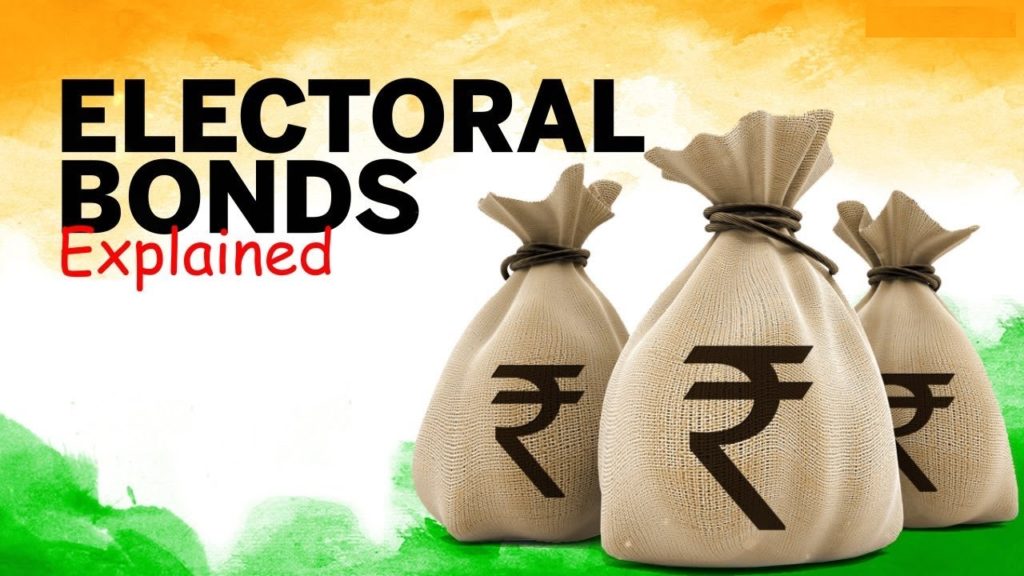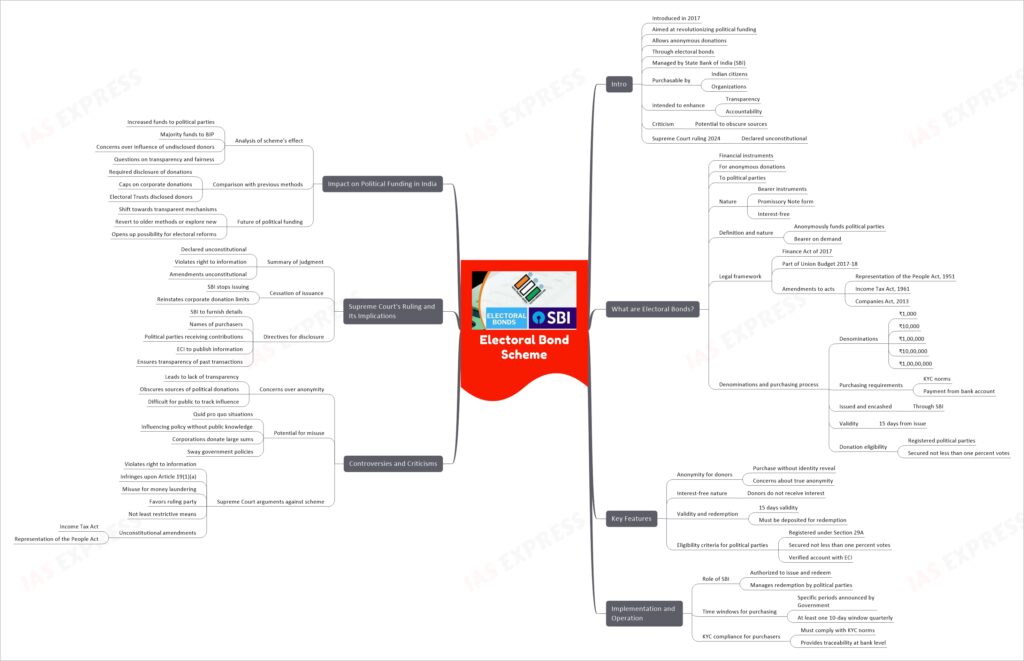[Indepth] What is Electoral Bonds Scheme & the recent SC ruling

From Current Affairs Notes for UPSC » Editorials & In-depths » This topic
IAS EXPRESS Vs UPSC Prelims 2024: 85+ questions reflected
The Electoral Bond Scheme, introduced in India in 2017, aimed to revolutionize political funding by allowing anonymous donations to political parties through interest-free bearer instruments known as electoral bonds. Managed by the State Bank of India, these bonds were purchasable by Indian citizens and organizations, intending to enhance transparency and accountability in political donations. However, the scheme faced significant criticism for its potential to obscure the sources of political funding, leading to a landmark Supreme Court ruling in 2024 that declared it unconstitutional.
What are Electoral Bonds?
- What are Electoral Bonds?
- Electoral Bonds are financial instruments for making anonymous donations to political parties.
- They function as bearer instruments in the nature of a Promissory Note and are interest-free banking instruments.
- Definition and nature of electoral bonds
- Designed as a mechanism to fund political parties in India anonymously.
- Operate as bearer instruments, meaning they do not carry the name of the payee and are payable to the bearer on demand.
- Legal framework under which they were introduced
- Introduced through the Finance Act of 2017, as part of the Union Budget 2017-18.
- Amendments were made to several acts including the Representation of the People Act, 1951, the Income Tax Act, 1961, and the Companies Act, 2013, to facilitate the introduction of Electoral Bonds.
- Denominations and the process of purchasing electoral bonds
- Available in denominations of ₹1,000, ₹10,000, ₹1,00,000, ₹10,00,000, and ₹1,00,00,000.
- Can be purchased by any citizen of India or a body incorporated in India, upon fulfilling KYC norms and making payment from a bank account.
- Issued and encashed exclusively through specified branches of the State Bank of India (SBI).
- Valid for a period of 15 days from the date of issue, during which they can be donated to political parties registered under Section 29A of the Representation of the People Act, 1951, and securing not less than one percent of the votes polled in the last general election.
Key Features of the Electoral Bond Scheme
- Anonymity for donors
- Donors could purchase electoral bonds without revealing their identity, ensuring privacy and protection from potential repercussions.
- The scheme was designed to keep the identities of the donors anonymous to the public, though concerns were raised about the true extent of this anonymity.
- Interest-free nature of the bonds
- Electoral bonds were interest-free banking instruments, meaning donors did not receive any interest on the amounts donated through these bonds.
- Validity period and redemption process
- The bonds had a validity period of 15 days from the date of issue, within which they had to be donated to eligible political parties and encashed.
- Political parties had to deposit these bonds into their designated bank accounts within the validity period to redeem them for funds.
- Eligibility criteria for political parties to receive funds through electoral bonds
- Only political parties registered under Section 29A of the Representation of the People Act, 1951, and which secured not less than one percent of the votes polled in the last general election to the House of the People or a Legislative Assembly, were eligible to receive donations through electoral bonds.
- These parties were required to have a verified account with the Election Commission of India (ECI) to deposit the bond amounts.
Implementation and Operation
- Role of the State Bank of India (SBI) in issuing and redeeming bonds
- The State Bank of India (SBI) was exclusively authorized to issue and redeem electoral bonds.
- SBI was responsible for ensuring the bonds were available during specified sale periods and for managing the redemption process by political parties.
- Specified time windows for purchasing electoral bonds
- Electoral bonds were available for purchase during specific periods announced by the Government of India.
- Typically, these windows were opened in the months leading up to major elections, with at least one 10-day window in each quarter of the financial year.
- KYC compliance requirements for purchasers
- Purchasers of electoral bonds were required to comply with the Know Your Customer (KYC) norms as mandated by the Reserve Bank of India.
- This involved providing valid identification and other relevant details to the bank at the time of purchase, ensuring a level of traceability at the bank level, despite the anonymity provided to the public and political parties.
Controversies and Criticisms
- Concerns over anonymity leading to lack of transparency
- The anonymity provided to donors through electoral bonds has been criticized for creating a lack of transparency in political funding.
- Critics argue that while the scheme was intended to clean up political funding, it instead obscured the sources of political donations, making it difficult for the public to track the influence of money in politics.
- Potential for misuse and influence on policy-making
- There are concerns that the anonymity of electoral bonds could lead to a “quid pro quo” situation, where donors could potentially influence policy decisions without public knowledge.
- The scheme has been criticized for potentially allowing corporations and other entities to donate large sums of money to political parties, which could then be used to sway government policies in their favor.
- Arguments presented in the Supreme Court against the scheme
- Petitioners in the Supreme Court argued that the scheme violated citizens’ right to information about the sources of political party financing.
- The Supreme Court found that the scheme infringed upon the right to information by anonymizing contributions through bonds, thus violating Article 19(1)(a) of the Indian Constitution, which pertains to freedom of expression.
- It was also argued that the scheme could be misused for money laundering and that it favored the ruling party by allowing it to potentially access donor information through the State Bank of India, a government-owned entity.
- The court applied a proportionality test and concluded that the scheme was not the least restrictive means of achieving the goal of curbing black money in elections, thus ruling the amendments to the Income Tax Act and Representation of the People Act as unconstitutional.
Supreme Court’s Ruling and Its Implications
- Summary of the Supreme Court’s judgment declaring the scheme unconstitutional
- The Supreme Court unanimously struck down the Electoral Bonds Scheme as unconstitutional, citing violations of the right to information under Article 19(1)(a) of the Constitution.
- The judgment highlighted that the scheme’s anonymity provision hindered the public’s right to know the sources of political funding and could lead to quid pro quo arrangements.
- The court also found that the amendments made to the Income Tax Act and the Representation of the People Act to facilitate the scheme were unconstitutional as they did not represent the least restrictive means of achieving transparency in political funding.
- Immediate cessation of the issuance of electoral bonds
- Following the verdict, the Supreme Court directed the State Bank of India (SBI) to immediately stop issuing any more electoral bonds.
- The court reinstated corporate donation limits, reversing the scheme’s provision that had allowed unlimited anonymous corporate donations to political parties.
- Directives for disclosure of past transactions
- The Supreme Court ordered SBI to furnish details of all electoral bonds purchased since April 12, 2019, including the names of the purchasers and the political parties that received the contributions.
- The Election Commission of India (ECI) was directed to publish the information shared by SBI on its official website by March 13, 2024, ensuring transparency of past transactions.
- This disclosure is expected to reveal the extent of contributions made through electoral bonds and the beneficiaries, thereby addressing the right to information of the electorate.
Impact on Political Funding in India
- Analysis of how the scheme affected political party funding
- The Electoral Bond Scheme significantly increased the funds available to political parties, particularly the Bharatiya Janata Party (BJP), which received the majority of the funds through this mechanism.
- The scheme allowed for anonymous donations, which led to concerns about the influence of undisclosed donors on political decisions and policy-making.
- The anonymity provided by the scheme meant that the public and regulatory bodies like the Election Commission of India (ECI) had no way of knowing who was funding political parties, which raised questions about the transparency and fairness of the electoral process.
- Comparison with previous methods of political funding
- Prior to the Electoral Bond Scheme, political parties were required to disclose donations above a certain threshold, which provided some level of transparency.
- The previous system also had caps on corporate donations based on the company’s net profits, which were removed with the introduction of electoral bonds, allowing for unlimited corporate donations.
- Electoral Trusts, under the earlier system, had to disclose their donors and the amounts received by political parties, unlike the Electoral Bond Scheme which did not require such disclosures.
- Discussion on the future of political funding post the Supreme Court’s ruling
- The Supreme Court’s ruling to scrap the Electoral Bond Scheme is expected to lead to a shift towards more transparent political funding mechanisms.
- Political parties may now have to revert to older methods of funding, which include direct donations with disclosure requirements, or explore new methods that comply with the Supreme Court’s emphasis on transparency.
- The ruling also opens up the possibility for the ECI and other stakeholders to push for comprehensive electoral reforms to ensure that political funding is transparent and does not unduly influence the democratic process.
The Supreme Court’s unanimous decision to declare the Electoral Bond Scheme unconstitutional marks a pivotal moment in India’s political funding landscape. By emphasizing the right to information and striking down the scheme for its lack of transparency and potential for quid pro quo arrangements, the ruling sets a precedent for future electoral reforms. It underscores the need for transparency in political donations, aiming to ensure a fair and democratic electoral process.
If you like this post, please share your feedback in the comments section below so that we will upload more posts like this.


